Fertility wrapped in plastic!
Endocrine disruptors are chemicals that interfere with the body’s endocrine system (the hormones). These disruptors produce adverse developmental, reproductive, neurological, and immune effects. The disruptors may be natural or man-made, such as pharmaceuticals, dioxin and dioxin-like compounds, polychlorinated biphenyls, DDT and other pesticides, and plasticizers, such as bisphenol A (BPA). These endocrine disruptors may be found in many products, including plastic bottles, metal food cans, detergents, flame retardants, foods, toys, cosmetics, and pesticides.
Based on animal studies, it is likely that BPA alters oviduct morphology and gene expression, it can reduce and/or impair implantation, it can even affect uterine morphology and function, it may cause abnormal menstrual periods. BPA is an ovarian toxicant that is likely to act via multiple pathways including apoptosis, oxidative stress, and folliculogenesis. In other words, there is evidence that the environment causes fertility risks.
Sadly, we have done this to ourselves. The one’s who try to protect themselves might find the task impossible. So, BPA is bad, alternatives to BPA are not much better, chemicals that make plastic soft, are bad. What can one do to avoid these chemicals? There are ways that one can try. Do not warm your food in plastic containers, remove all food from plastic containers, use a drinking bottle made of glass, open windows for fresh air when you can, avoid overusing cosmetics, wash your new clothes before first time use, drink your coffee from proper mug and try to keep calm. Choose when you can, and don’t worry too much when you can’t.
Elina Botha, MHSc, RM, PHN, Doctoral Researcher, Senior Lecturer, Midwifery
Tampere University of Applied Sciences, Kuntokatu 3, 33520 Tampere, Finland

 Previous Post
Previous Post Next Post
Next Post



